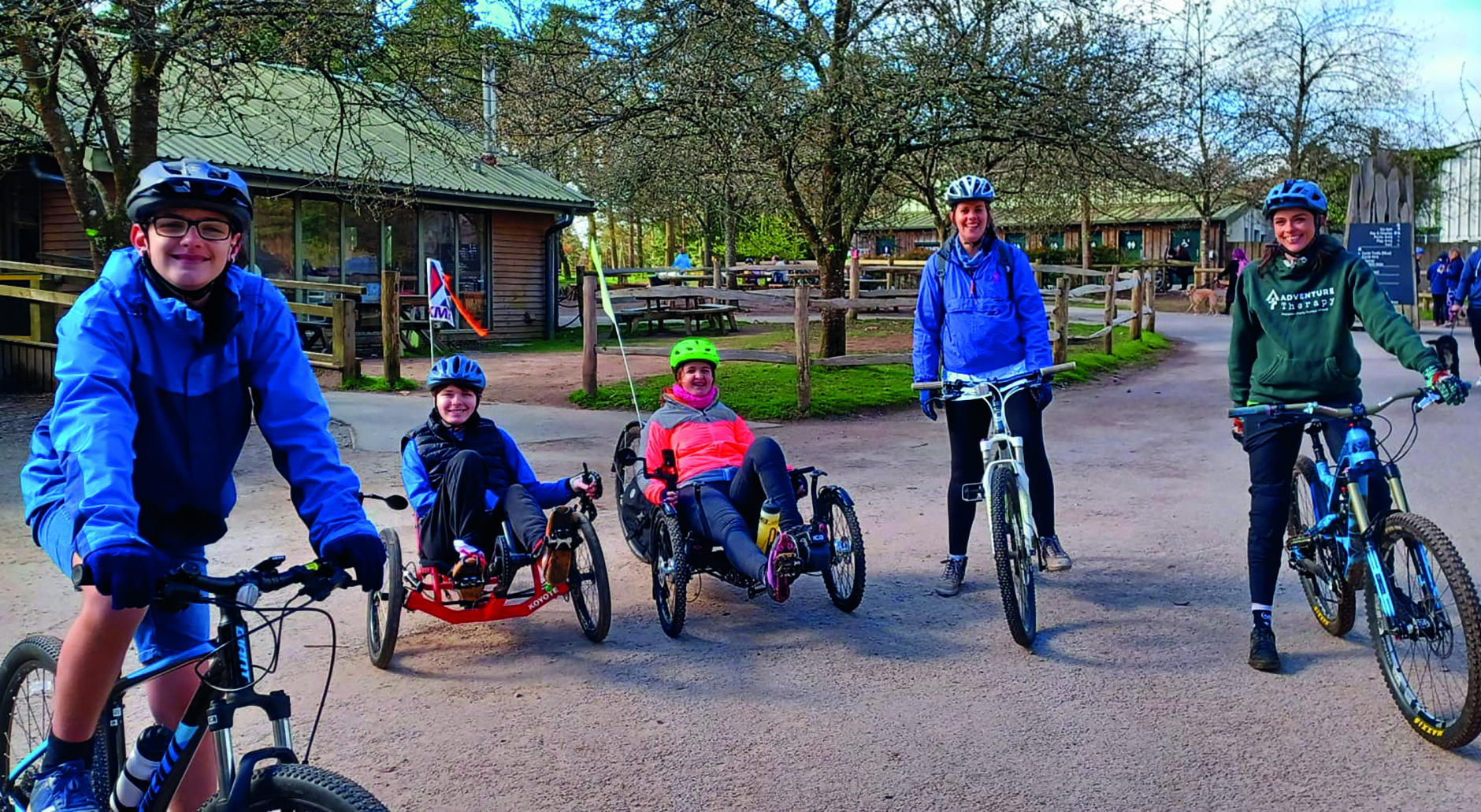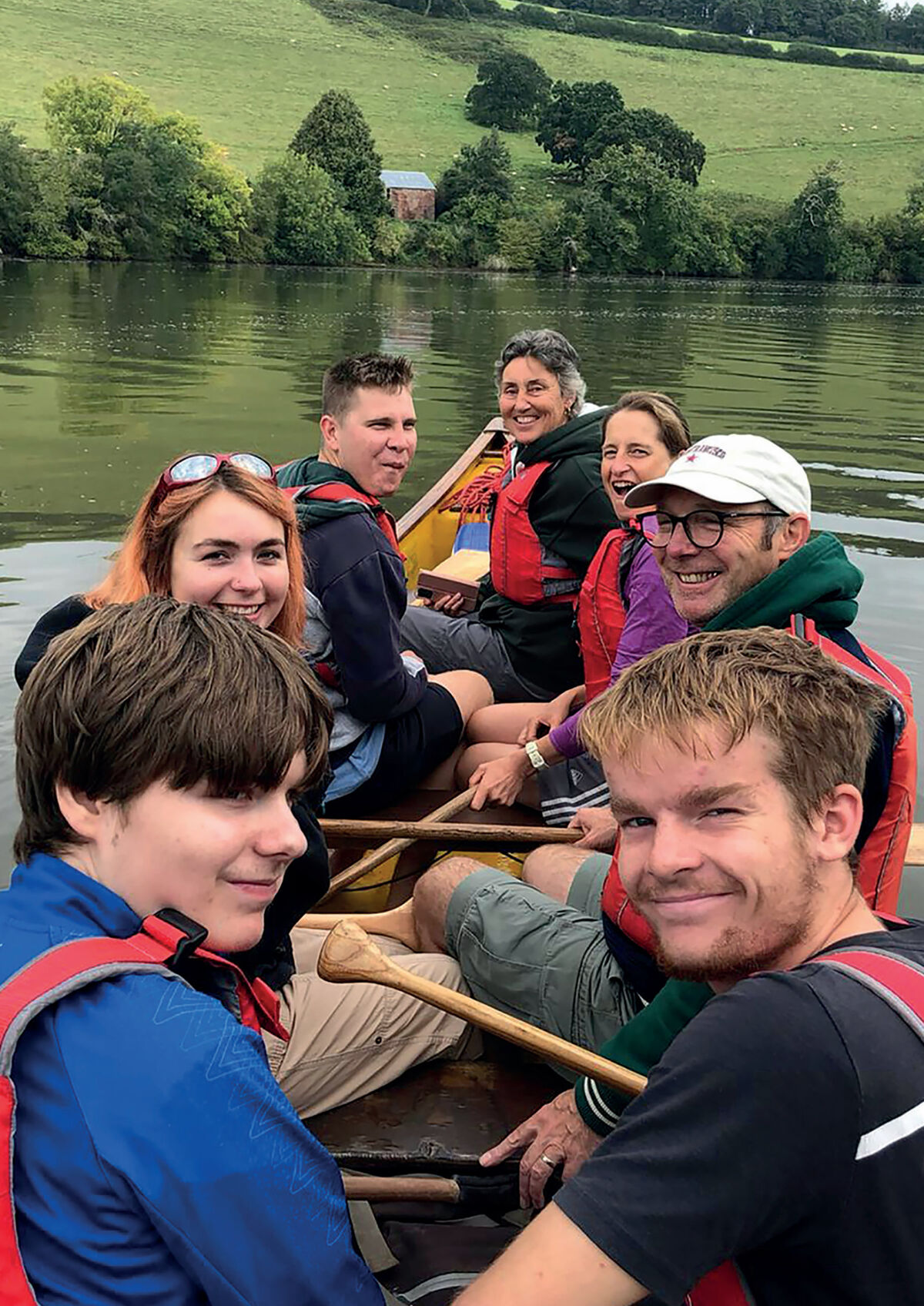Penny Weekes looks at occupational therapy’s role in working with young people and their families following acquired brain injury, as one part of the variety of opportunities available through an adventure therapy charity.
Getting outdoors, playing with friends, challenging yourself and discovering your own identity are key components to growing up. This often becomes increasingly difficult after acquired brain injury, as the young person faces the vast array of difficulties that continue to change and emerge with the brain’s ongoing development.
Many young people and their families become socially isolated and life can take a downward spiral at school, home and in the community. As an occupational therapist working within the charity Adventure Therapy, we are able to offer outdoor activities to rehearse skills lost through injury, promoting post-acute rehabilitation and longerterm recovery.
We cater for young people aged from eight years up and last year we expanded our groups to include a young adult group aged 16 to 30, which has allowed us to support young people to gain independence as they transition across the gaps in education and statutory services.
Our sessions take place outside of the usual school or college day and the activities are selected to enhance cognitive, physical, social and communication skills.
We focus on the development of executive function and incorporate the principles of managing fatigue, both frequently affected after acquired brain injury.
The benefits of therapy in the outdoors are widely documented for both physical and mental health and we use the principles of occupational therapy, using function to address the occupational performance of a young person to create purpose and fulfilment in their lives.
Our qualified and experienced outdoor instructors lead activities, while the natural environment provides the setting for exploration, adventure and recovery. We offer 20 activities on land and water, from kayaking, surfing, sailing and paddle boarding, to horse riding, caving, climbing, archery, bushcraft and navigation skills.
All activities are designed to support the young person as they work on their recovery goals, gain confidence to access new adventures, or develop skills in teamwork and preparation for employment. Everyone in our young adult group attends outdoor first aid sessions.
We may choose an activity to bring rhythm, comfort, and a calmness to the limbic system and central nervous system, enabling the young person to focus on the activity, increasing their attentional control and instilling a sense of control, while leaving the noise and stresses of everyday life behind for a while.
Once they have experienced how to do this, they can start to transfer it into their daily routines.
We can also choose an activity to provide stimulation and excitement – a physical challenge, or a sense of mastery. We can generate the ability to listen, understand and follow instruction, and keep ourselves safe and look out for others; all skills that can be rehearsed and used in their life at home or at school.
Using all our senses, combined with physical activity, activates our endorphins – our feel-good hormones.
Creating options for young people and their families
One of our occupational therapy roles is to create options at a time when many options have been lost or taken away from our young people and their families.
The family are a key element in the recovery process after acquired brain injury, and a ‘best friend’ who remains on side is one of the strongest indicators of a good outcome for a young person. It’s therefore essential to include them in our activities. We welcome siblings and best friends to our sessions and offer family days when parents can take part in our activities too.
We provide a monthly parent /grandparent group, giving the opportunity to learn about the functions of the brain, the effects of injury and to share coping strategies to enhance success at school and at home. This provides a learning and a support role in a safe space, where parents can spend time with others who share a lived experience.
Parents say that finding this group is often the first time they have been able to understand the effects of injury and experience the relief of being in an environment where they themselves feel understood.
The change we are able to effect is probably best described through a poem written by one of our young people (see box out ).
I sat at home, I’d lost my friends, there’s no one here to play ‘Where is all the fun I had?’ It’s upped and gone away – School is sad and difficult, my body is in pain My parents tell me to cheer up and get a life again ‘I don’t know where to start’ I say, ‘I’ve lost the boy who’s me’ ‘I look for him every day, he’s disappeared you see’ ‘Help me’ I scream, ‘I’m drowning in a sea of disbelief’ ‘My world has gone, my friends are gone, and all I feel is grief’ But… all it took was a friendly smile from someone in the know, Who picked me up and took me out with others in the snow, I braved the cold, I built some fires, I felt the woods around me I watched the ocean from a boat and let new friends surround me…

Above : Cycle challenge on the forest trails
Breaking down barriers to inclusion
Those who join us are often marginalised socially and describe feelings of isolation, being left out and not feeling that they belong. There may be a loss of previous social networks as friends drift away with time, young people may have been dropped from sports teams or no longer seen as ‘cool’ to be with.
Facial scarring or physical disability can become a barrier to inclusion, or unusual behaviours may cause others to withdraw. Anxiety and depression may limit confidence and create difficulties in getting out and about socially.
Social connection is one of the five pillars in maintaining sound mental health, so this is a key component in our activities with Adventure Therapy.
We are all aware of the importance and purpose of fun and play in life, but especially during recovery from illness or injury we need the opportunity to play freely, without a set script often required in school or workplaces. This freedom brings creativity and an opening to create a new acceptance of ourselves or our situations.
Focusing on doing something we love allows our body and brain to relax. It resets our stress hormones and promotes our mental resilience. It is restorative.
When you see a child jumping with excitement you know you are activating the pathways within the brain to create eager anticipation, optimism and positive hope. These pathways in turn activate pathways that trigger engagement and purposeful activity, which in turn leads to achievement and a feel-good factor that completes the circle of wellbeing.
Someone who may be limited either in their physical mobility, or through difficulties with their mental health, may be experiencing too much passive activity. This means they are not currently building their skills or confidence to experience a variety of life events and making of new memories.
Deliberate effort and engagement in outdoor activity brings a wealth of opportunity for people of all ages and abilities to learn, develop and importantly, to effect lasting change.
Challenging unhelpful beliefs around disability
At Adventure Therapy we promote a ‘can do’ approach, adapting the activity to ensure everyone can participate in some way. We encourage all our participants to rise to the challenges they set for themselves.
We also challenge some unhelpful beliefs in society around disability through an inclusive approach to outdoor activity.
Through careful risk assessment and by knowing our participants well, we are able to introduce them to fire lighting, knife skills, going out in all weathers, tackling tricky terrain, and promoting a sense of independence and adventure that may have been denied them since injury or illness.
All our activities focus on developing the neural substrate supporting wellbeing and boosting recovery. Our brains are primed to respond to the experiences and environments around us. Given this opportunity we allow ourselves to experience it and enjoy it, remember it and generalise it, changing the circuitry within our frontal lobes and limbic systems.
This impacts on our brain chemistry, leading to the potential for lasting change. Effort based reward promotes efficacy and persistence toward further development.
We use outdoor activity to demonstrate to the young person how their injured brain can learn new skills; the more new experiences we have, the more choices we have to manage our lives ahead.
Our activities are not just about putting on a happy face, they are about changing that face. We aim to have fun together in a safe setting and our knowledge of acquired brain injury and our professional neuro-experience allows parents to leave their young people with us in confidence.
Words PENNY WEEKES, Clinical Specialist Occupational Therapist for young people with acquired brain injury and their families. For further information contact Amy Weekes, Project Coordinator amy.weekes@adventuretherapy.org.uk. To explore more about the charity visit adventuretherapy.org.uk
